

E-Books → Biblical Exegesis and Mystical Theology in the Venerable Bede (True PDF)
Published by: voska89 on 17-03-2024, 23:49 |  0
0
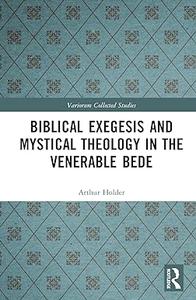
Free Download Biblical Exegesis and Mystical Theology in the Venerable Bede
by Arthur Holder
English | 2024 | ISBN: 1032639083 | 265 Pages | True PDF | 16 MB
E-Books → Biblical Exegesis and Mystical Theology in the Venerable Bede (EPUB)
Published by: voska89 on 17-03-2024, 23:49 |  0
0
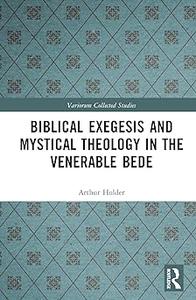
Free Download Arthur Holder, "Biblical Exegesis and Mystical Theology in the Venerable Bede "
English | ISBN: 1032639083 | 2024 | 264 pages | EPUB | 870 KB
Biblical Exegesis and Mystical Theology in the Venerable Bede brings together 17 essays by Arthur Holder exploring the theology and spirituality found in Bede's biblical commentaries and homilies. The volume shows that Bede was both a masterful student of received tradition and a creative thinker concerned to address the needs and interests of his audience of Christian pastors and teachers in the eighth-century Northumbrian church.
E-Books → A Canonical Exegesis of the Eighth Psalm YHWH's Maintenance of the Created Order through Divine Reversal
Published by: voska89 on 13-03-2024, 00:47 |  0
0
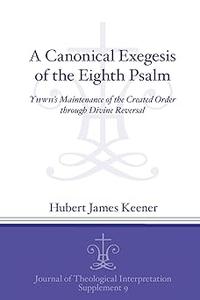
Free Download Hubert James Keener, "A Canonical Exegesis of the Eighth Psalm: YHWH's Maintenance of the Created Order through Divine Reversal "
English | ISBN: 1575067080 | 2013 | 234 pages | PDF | 6 MB
Since Brevard Childs first introduced it as a "fresh approach" in the late 1960s, canonical exegesis has grown into a widely discussed and developed program―virtually a "school" of biblical interpretation―with many scholars carrying forward an approach to theological exegesis that emphasizes the role of canon as the central context for interpretation of the Christian Scriptures. In this study, Keener takes a twofold approach: (1) he demonstrates that a canonical exegesis is tenable if the task is approached with clarity regarding its core theological foundation; and (2) he applies the approach to the interpretation of the often thorny questions surrounding the understanding of Psalm 8. This is useful in that Psalm 8 touches upon several questions germane to the successful implementation of canonical exegesis due to the many intertextual connections it shares with the rest of the Bible. Keener concludes that Psalm 8 in the Old Testament represents the intersection of two trajectories: (1) the reversal motif in which YHWH maintains the created order through the exaltation of the weak and the humble; and (2) the motif of the conflicted and conflicting human, in which humans are shown as beset by trials, often failing and even occupying the role of the enemies of YHWH. A third trajectory becomes visible in the context of the New Testament, that of the redeeming Christ; this third trajectory intersects with the two Old Testament trajectories and makes possible the redemption of conflicted humanity, giving the ultimate answer to the psalmist's question, "What is the human?"
E-Books → Clement and Scriptural Exegesis The Making of a Commentarial Theologian
Published by: voska89 on 11-02-2023, 00:19 |  0
0
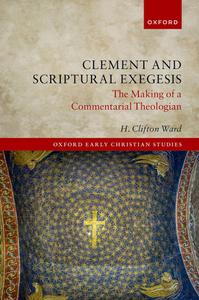
Clement and Scriptural Exegesis: The Making of a Commentarial Theologian (Oxford Early Christian Studies) by H. Clifton Ward
English | June 30, 2022 | ISBN: 0192863363 | True EPUB/PDF | 256 pages | 1/2.1 MB
How might one describe early Christian exegesis?
E-Books → Scripture Re-envisioned Christophanic Exegesis and the Making of a Christian Bible
Published by: voska89 on 30-12-2022, 15:52 |  0
0
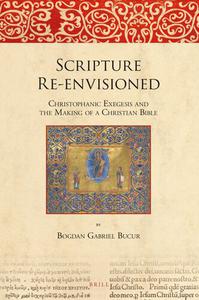
Scripture Re-envisioned: Christophanic Exegesis and the Making of a Christian Bible (Bible in Ancient Christianity, 13) by Bogdan Gabriel Bucur
English | 2018 | ISBN: 9004386106 | 346 pages | PDF | 14 MB
In Scripture Re-envisioned Bogdan B. Bucur discusses the exegesis of biblical theophanies as an essential "ingredient" for the gradual crystallization of a distinct Christian exegesis, doctrine, liturgy, and spirituality during the first millennium CE.
E-Books → Theological Approaches to Qur'anic Exegesis A Practical Comparative-Contrastive Analysis
Published by: voska89 on 3-09-2021, 23:24 |  0
0
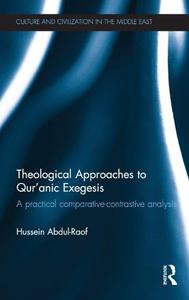
Theological Approaches to Qur'anic Exegesis: A Practical Comparative-Contrastive Analysis By Hussein Abdul-Raof
2012 | 304 Pages | ISBN: 0415449588 | PDF | 3 MB
[center]
E-Books → The Bishop and the Apostle Cyprian's Pastoral Exegesis of Paul
Published by: voska89 on 28-07-2021, 19:01 |  0
0
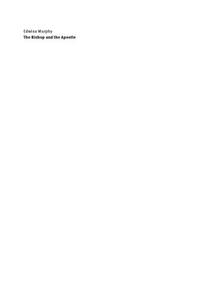
The Bishop and the Apostle: Cyprian's Pastoral Exegesis of Paul By Edwina Murphy
2018 | 242 Pages | ISBN: 3110601036 | PDF | 2 MB
[center]
E-Books → Rewriting Magic An Exegesis of the Visionary Autobiography of a Fourteenth-Century French Monk
Published by: voska89 on 28-07-2021, 14:17 |  0
0
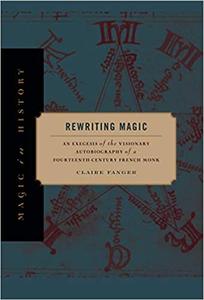
Claire Fanger, "Rewriting Magic: An Exegesis of the Visionary Autobiography of a Fourteenth-Century French Monk "
English | ISBN: 0271066504 | 2015 | 232 pages | EPUB, PDF | 6 MB + 8 MB
In Rewriting Magic, Claire Fanger explores a fourteenth-century text called The Flowers of Heavenly Teaching. Written by a Benedictine monk named John of Morigny, the work all but disappeared from the historical record, and it is only now coming to light again in multiple versions and copies. While John's book largely comprises an extended set of prayers for gaining knowledge, The Flowers of Heavenly Teaching is unusual among prayer books of its time because it includes a visionary autobiography with intimate information about the book's inspiration and composition. Through the window of this record, we witness how John reconstructs and reconsecrates a condemned liturgy for knowledge acquisition: the ars notoria of Solomon. John's work was the subject of intense criticism and public scandal, and his book was burned as heretical in 1323. The trauma of these experiences left its imprint on the book, but in unexpected and sometimes baffling ways. Fanger decodes this imprint even as she relays the narrative of how she learned to understand it. In engaging prose, she explores the twin processes of knowledge acquisition in John's visionary autobiography and her own work of discovery as she reconstructed the background to his extraordinary book. Fanger's approach to her subject exemplifies innovative historical inquiry, research, and methodology. Part theology, part historical anthropology, part biblio-memoir, Rewriting Magic relates a story that will have deep implications for the study of medieval life, monasticism, prayer, magic, and religion.
E-Books → Rewriting Magic - An Exegesis of the Visionary Autobiography of a Fourteenth-Centu...
Published by: ad-team on 28-07-2021, 10:24 |  0
0
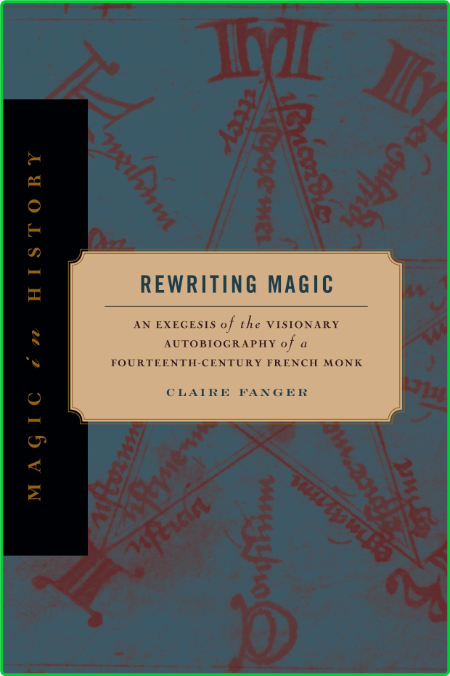
Rewriting Magic - An Exegesis of the Visionary Autobiography of a Fourteenth-Century French Monk
pdf | 8.5 MB | English | Isbn: 0271066512 | Author: Fanger, Claire | Year: 2015
E-Books → Mind, Text, and Commentary Noetic Exegesis in Origen of Alexandria, Didymus the Blind, and Evagrius Ponticus
Published by: voska89 on 26-07-2021, 17:08 |  0
0
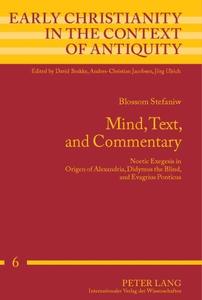
Mind, Text, and Commentary: Noetic Exegesis in Origen of Alexandria, Didymus the Blind, and Evagrius Ponticus By Blossom Stefaniw
2010 | 421 Pages | ISBN: 3631602677 | PDF | 11 MB
Scholarship on early Christian exegesis is full of puzzlement at the commentator's apparent lack of concern for the literal or historical meaning of the text, usually explained as the result of an illegitimate allegorical method. This study comes to grips with the particularities of this type of interpretation by using tools from ethnography and literary criticism. By analysing the commentator's interpretive assumptions and the framework of significances within which the commentaries were produced and read, the author is able to solve a chronic problem in the study of early Christian exegesis. Further, she articulates the social context of the performance of noetic exegesis and its significance for monastic teachers, philosophers, and their audiences.



